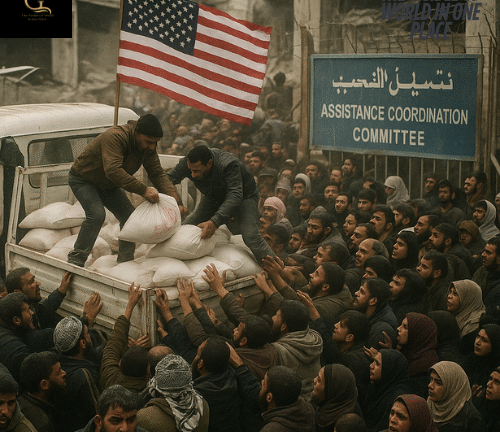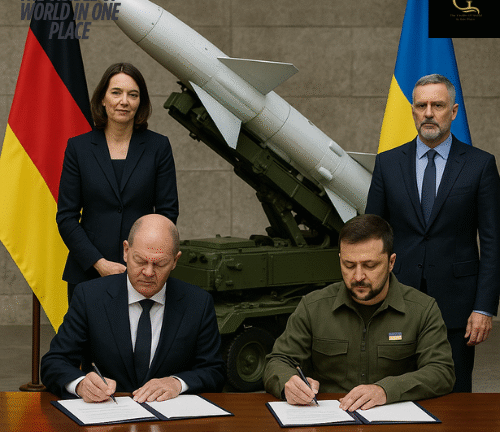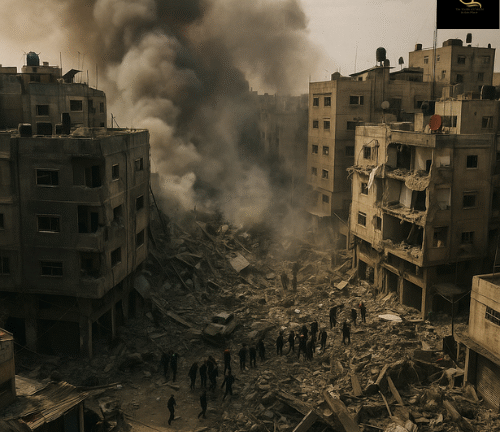A newly opened aid distribution centre in Rafah, southern Gaza, was overrun by hundreds of Palestinians on May 27, 2025, underscoring the worsening humanitarian situation brought on by more than two months of Israeli embargo and fighting. Only a day earlier, the centre, run by the Gaza Humanitarian Foundation (GHF), a contentious organisation supported by both Israel and the United States, had started operations with the intention of avoiding the United Nations-led aid system, which Israel and some U.S. officials claim is compromised or used by Hamas.
In a frenzied rush for food, crowds overran the distribution facility, breaking down dirt barriers and gates. Men, women, and children were seen on camera rushing into the compound, with some of them running and ducking as gunfire could be heard. Although it denied any injuries, the Israeli military eventually acknowledged that its men had fired warning shots to maintain control. Witnesses reported frantic scenes, with people clambering for the few food boxes left, shoving past one another, and scaling barriers. Because of the large number of people at the Secure Distribution Site (SDS), GHF employees temporarily withdrew, claiming security concerns.
The GHF estimates that about 8,000 food boxes were distributed, with each box potentially supplying 462,000 meals. Although it did not offer independent confirmation, the organisation stated that blockades imposed by Hamas were the reason of operational delays. In order to prevent injuries and give the throng time to disperse, the GHF team momentarily left the compound, according to a statement. Later that day, the distribution returned to normal.
International humanitarian organisations, such as the UN and other NGOs, are deeply divided about GHF’s strategy. These groups have declined to work with GHF on the grounds that its methodology goes against basic humanitarian ideals including independence, impartiality, and neutrality. They contend that GHF’s practices run the risk of politicising the distribution of aid and putting recipients in danger. Serious operational and ethical issues have been brought up by the employment of armed American contractors, cooperation with the Israeli Defence Forces (IDF), and biometric checking at distribution locations.
GHF’s centralised distribution system has drawn criticism for potentially harming vulnerable groups, especially those who are unable to pass screening tests or have mobility issues. Humanitarian aid is universal and unconditional, but there is concern that it may be made subject to political loyalty or security protocol compliance.
The UN called the events at the Rafah location “heartbreaking.” The UN and its partners have a comprehensive and workable relief plan available, backed by a number of member nations, UN spokesperson Stéphane Dujarric stressed. In order to avoid famine and provide for the needs of all Gazan people, he reaffirmed the necessity of an expanded humanitarian response. The U.S. State Department, however, brushed off such criticism as “hypocritical,” with spokesperson Tammy Bruce claiming that the fact that aid was being offered at all was the true problem, not who was providing it. Although she conceded that there were conflicts regarding implementation, she maintained that the meal delivery was ultimately good news.
Days before the launch of the assistance facility, GHF Executive Director Jake Wood resigned, further complicating matters. “Under current political and military constraints, the group could not operate in a way that upheld core humanitarian values,” Wood said. The board of GHF responded by dismissing Wood’s criticism and charging critics with wanting to keep things as they are rather than provide relief to those in dire need.
The Gaza government, Hamas, has openly cautioned Palestinians against collaborating with GHF’s charity scheme. The group refutes accusations from Israel and GHF that it is attempting to obstruct or embezzle aid. Israel, on the other hand, insists that its efforts to identify alternate routes of distribution are required to guarantee that aid does not get into the hands of Hamas. Additionally, Israel has said that Hamas threatens NGOs that decide to collaborate with GHF.
Israel has permitted at least 665 trucks carrying humanitarian aid to enter Gaza since lifting its siege in response to pressure from other countries. These shipments have contained essentials like medicine, baby formula, and flour. But as of May 27, more than 400 truckloads of aid were still waiting for the UN to distribute them further at the Kerem Shalom gate into Gaza. The UN pointed to instability, looting, and logistical problems with Israeli forces as the main obstacles, while Israeli officials criticised the UN’s pace and said it was not fulfilling its obligations.
The humanitarian needs in Gaza are still too great, even with the flood of relief. In light of the extent of the need, the UN World Food Programme recently referred to the arriving help as a “drop in the bucket.” The cost of necessities has skyrocketed, and a large portion of the population still has restricted access to food. Half a million Gazans are in danger of famine, according to an Integrated Food Security Phase Classification (IPC) assessment supported by the UN.
After Hamas attacked Israel on October 7, 2023, killing 1,200 Israelis and taking more than 250 hostage, the combat deadly escalated, leading to this crisis. According to Gaza’s Hamas-run health ministry, Israel’s military assault has now destroyed a significant portion of Gaza, killing around 54,000 Palestinians. Thousands more have been displaced and civilian conditions have gotten worse as a result of recent Israeli operations, including an expanded attack in southern Gaza.
In order to serve up to one million people by the end of the week, the GHF has announced plans to set up four distribution locations throughout southern and central Gaza. IDF patrols and American contractors are present at these highly guarded locations. Aid organisations have sharply criticised the entry requirements, which include identity verification and screening for Hamas links. These organisations maintain that humanitarian aid must be impartial and unconditional.
The complicated, intensely politicised, and increasingly desperate effort to provide help in Gaza is summed up by the events in Rafah. The humanitarian situation worsens, trapping populations between conflicting forces, political agendas, and ineffective aid agencies as widespread starvation looms and confidence in international systems erodes. Dignity, safety, and the right to life are now more important factors in the struggle for survival for many Gazans than food.




